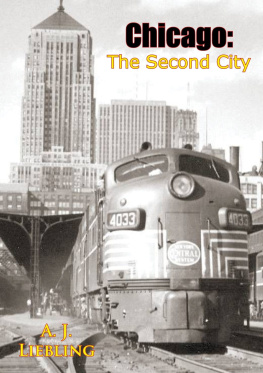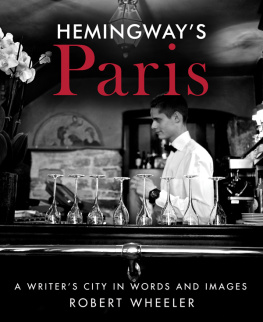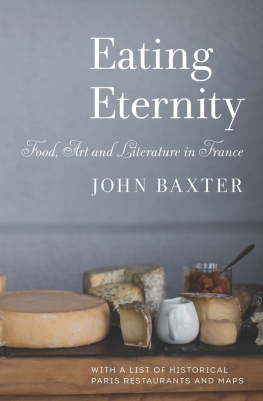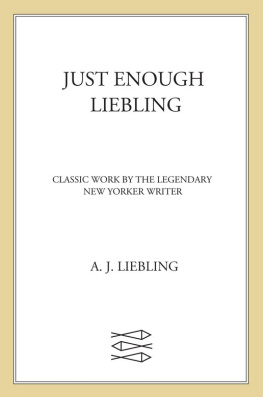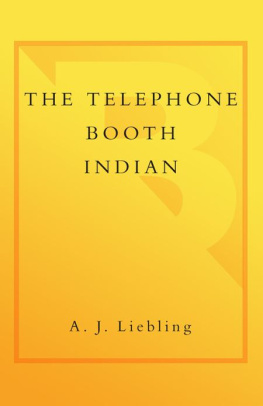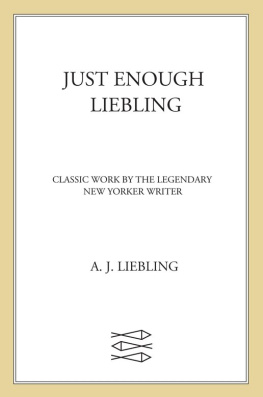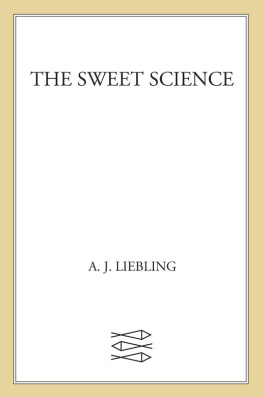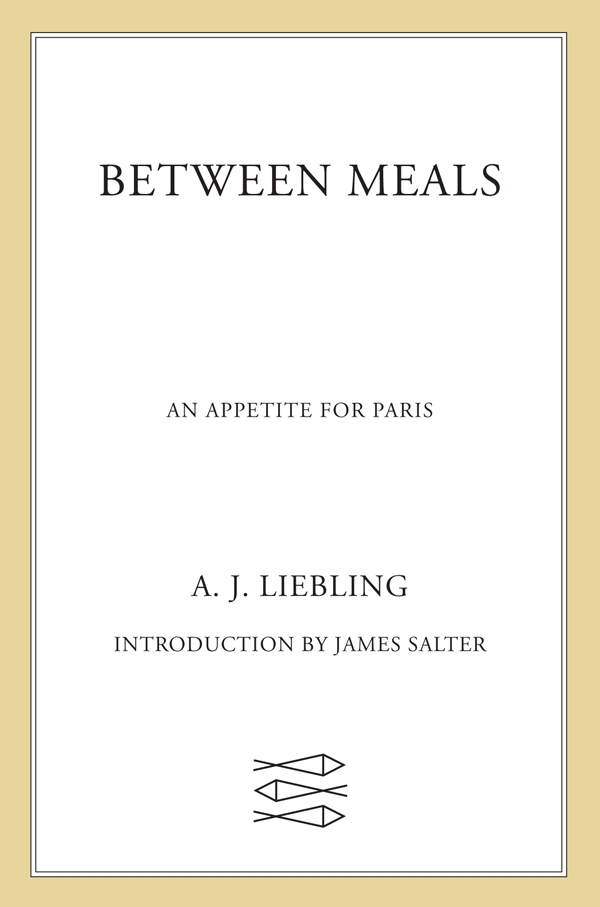Contents
Guide

The author and publisher have provided this e-book to you for your personal use only. You may not make this e-book publicly available in any way. Copyright infringement is against the law. If you believe the copy of this e-book you are reading infringes on the authors copyright, please notify the publisher at: us.macmillanusa.com/piracy.
TO YVES MIRANDE
A. J. Liebling belonged to the generation, now gone, that lived through both World Wars and, further, to that fabled splinter of it that knew Paris in what seems to us its most glorious days. He was a journalist all his life, beginning as a provincial reporter, then moving to New York, working for several papers there, and finally becoming a writer for The New Yorker. He possessed from the first and gradually perfected a very idiomatic style, one of precision, ease, and richness of detail. It won him the devotion of readers as well as friends. The voice becomes unmistakable, that of a large, unkempt man with a gift as exact as Cyril Connollys, rummaging around in a huge bin of what might be called demi-classical references: literary, gastronomic, sporting, historic.
Journalists cannot expect their work to last. Even Dreisers or Hemingways articles are of little interest to us. Though the standards for prose at The New Yorker were and are unusually high, there is only so much room in the stacks to be given to things of passing concern, and magazine pieces are not the path to being remembered.
Autobiography, though, is another matter, as is memoir and in this book, most of which appeared originally as a series of four articles, we have a mixture of both, done with an elegance and wit that make one feel it may endure. It is Lieblings last book, published just before the end, although the writing in it was spread over twenty years and takes in more than fifty, from his earliest visits to Paris as a childhe was born in 1904to almost his final trip a few months before his death in 1963, when, tired, ill, unable to write, he made a late summer journey to France, probably knowing he would not see it again.
He had remarkable talent although he may not have made the best use of it. As many other reporters have done, he dreamed of being a novelist or short story writer with newspapers only a way station on the road to greatness, but though he had a novelists eye he was for some reason never able to become one. He wrote occasional short stories during his career and made at least one attempt to write a novel but gave it up. He finally settled for what he had begun as, a journalist, loving and hating it at the same time, its privileges, irregular hours, allure. The taint was on me, he wrote of himself, and driven by habit and need of money he continued for years never out of debt to the magazine for which he wrote prodigiously. He knew his abilitieshe was fond of saying that he could write better than anyone who could write faster, and faster than anyone who could write better, and he could sit down in his cluttered office and in an afternoon or evening turn out four or five thousand impeccable words without getting winded. It was hard work but he knew how to do it. He also knew the melancholy of having recognition come late. His personal life was not happy. He was married three times. His first wife was mentally ill and unfaithful. She was a good looking, uneducated Irish girl whom he had met when she was working in a movie box office in Providence. His parents disapproved of the marriage. He was Jewish and she was not; she was of a lower class. After fifteen years and a long separation during which she was in and out of institutions they were divorced, although he remained loyal to her and continued to send her money all his life. His second wife was beautiful and extravagant, a divorce with a teen-age daughter. She left him unexpectedly. His third and last wife was the writer Jean Stafford, who had once been married to Robert Lowell.
Physically, Liebling was not attractive yet women liked him. Bald, overweight, and gluttonous was how he described himself. He ate and drank to excess. He was shy and given to long silences. He wore glasses. His feet were flat and it was painful for him to walk, especially in later life when he had gotten so large that it was impossible, a fellow writer said, to walk beside him on the sidewalk. He also had gout. Despite this women were often fond of him, even pretty women. As a friend of his explained, he made them feel intelligent. This was not a tactic, it was genuine.
The son of an immigrant who did very well for himself as a furrier, Liebling had rebelled against his bourgeois upbringing. He saw his fathers New York world as soulless and gross and while remaining an affectionate son he nevertheless stubbornly went his own way, choosing things that were contrary to what might be expected. German by background, he rejected Germany for France. In school his companions were athletes, some less than admirable, and the girls he fell in love with were gentile. His pull was towards the disreputable elements of society, the seamy part of life, men who lived by their wits, and he wrote about petty crooks, politicians, and phonies. It was the Dickensian layer of the city he was drawn to. His sympathies were with the little man, the underdog; he liked people who led unconventional lives. He was at ease with them and they with him, a big, rumpled figure with a homely face and his navel showing through an unbuttoned shirt. He wrote especially well of boxing, the thrilling, soiled world of fighters, their managers and trainers. He had boxed a little himself, not particularly well, and retained a great interest in it.
When he was twenty-two his father, who had never known much leisure himself until late in life, generously gave him the gift of a year of study at the Sorbonne and it is that year that is the emotional center of this book. He attended very few classes but learned things that stood him in good stead for the rest of his life.
The year was 192627 and the Paris he discovered is like Cavafys Alexandria, William Kennedys Albany, or Bellows Chicagoa city seen mainly from the underside with occasional glimpses into upper realms. The book is a kind of guide to a legendary Paris, parts of which no longer exist. Liebling was collecting, like the bits of string and shiny metal the magpie brings back to its nest, the discarded things that carry emotional power, fragments of a fabulous and disappearing city, the same city that Hemingway and Gertrude Stein fell in love with, a city in the 1920s exhausted by the effort of four years of war with huge casualties, and weary despite the final triumph. The face was still ravishing but the tone of the skin had lost its freshness and there were faint lines in the brow and around the mouth.
There are no famous names strewn here. It was all lived and written beyond the illumination of art and fashion, but here is Paris in the days when there were brothels that were visited by princesthe most famous of them was on the rue Chabanais and there are the photographs by Brassai of others. The aristocracy of Russia, which had fled revolution and civil war, was driving taxicabs and working in nightclubs, and in a few minutes Lindbergh was to arrive.
Waverley Root, who was a food writer and Lieblings friend and whose book The Food of France is a kind of shadowy companion to Lieblings, was a young newspaperman in Paris at the time. Lindbergh had landed at Le Bourget and in his memoirs Root tells of an unbelievable crowd swarming towards the plane and someone climbing up to grab the leather helmet from Lindberghs head and waving it in the air. The mob, mistaking him for the hero, bore him off on its shoulders. There were South American playboys living in Paris who boasted they had never seen it in daylightthey rose in the evenings and went to bed before dawn. It was a city of luxury and light and of course of their extreme opposites, drabness and poverty. But Paris was then and in many ways remains first among all the cities of the world. The French way of living, the French outlook on things, French literature, art, films, cuisine, not to speak of architecture, ocean liners, automobilesthese were the highest standard that existed and even now one looks back at them with admiration.


